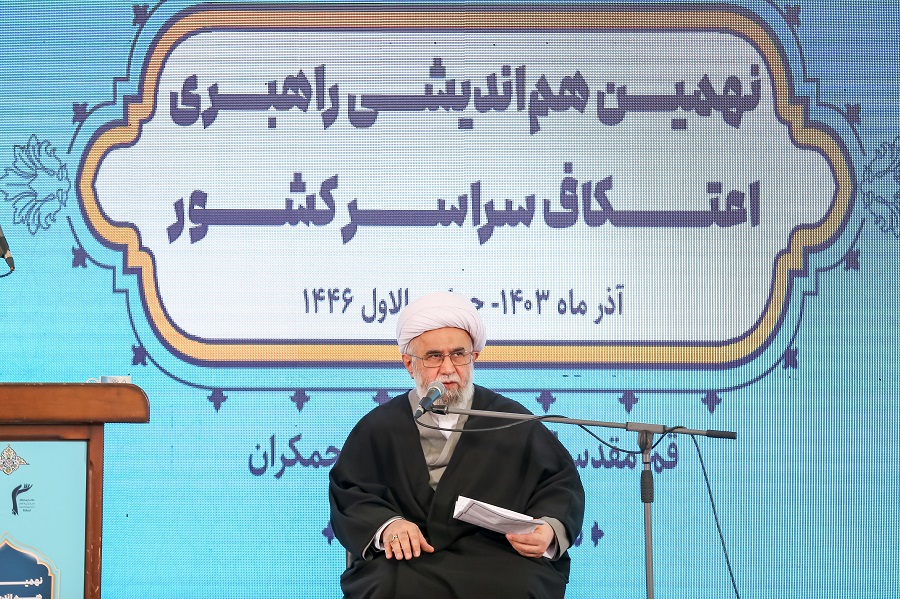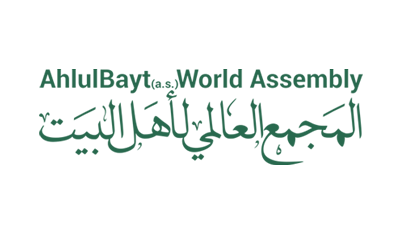I’tikaf Transforms Personal Worship into Social Responsibility: Ayatollah Ramazani
Ayatollah Reza Ramazani, Secretary-General of the AhlulBayt (a.s.) World Assembly stressed that by relying on Tawhid spirituality and Islamic teachings, it is possible to establish a new Islamic civilization and permanently resolve the identity crises of contemporary societies.
ABWA Official Website – Ayatollah Ramazani made these remarks during the 9th Workshop for I’tikaf Management held at the Holy Mosque of Jamkaran. Highlighting the role of spirituality in modern Islamic civilization, he stated, “I’tikaf is a valuable opportunity to strengthen Islamic identity and expand Tawhid spirituality, which stands among the most prominent features of Islamic civilization.”

Emphasizing that Islam guides humanity across personal, social, and global dimensions, Ayatollah Ramazani said, “Islam, in the truest sense, is comprehensive and profound. We must adopt a holistic view of it. The religion’s comprehensiveness allows it to address all human needs, manifesting divine attributes of beauty and majesty in its teachings. I’tikaf exemplifies this by strengthening the bond between humanity, God, and society, guiding individuals toward dignity and justice.”
Referring to the role of Islamic spirituality in modern Islamic civilization, Ayatollah Ramazani said, “Unlike deviant spiritual schools of thought in the West, which are either confrontational or dismissive of responsibility, Islamic spirituality is rooted in Tawhid and fosters responsibility. This spirituality directs individuals toward social justice and human dignity, ensuring that all acts and worship in an Islamic framework are performed to seek closeness to God.”
I’tikaf: A Model for Personal Growth and Collective Interaction
Ayatollah Ramazani described I’tikaf as an effective educational model, noting, “In addition to its personal aspects, I’tikaf provides a unique opportunity to enhance religious identity and foster spiritual interaction among Muslims. Centered on the Sharia principles, this spiritual practice elevates individuals to higher human status while linking private reflection with social responsibility.”
Secretary-General of the AhlulBayt (a.s.) World Assembly stressed the importance of Sharia in Islamic spirituality, describing it as “a bridge that connects individuals to higher levels of spirituality and understanding. I’tikaf, preserving Sharia rules, leads participants toward self-purification and responsibility, paving the way for the realization of a new Islamic civilization.”
Referring to the growing spiritual crisis in the West, Ayatollah Ramazani said, “In Western societies dominated by liberal systems, a clear void of spirituality exists. This absence has driven many Western youths toward false spiritual ideologies. In contrast, the Islamic system, relying on Tawhid spirituality, offers a profound solution to humanity’s spiritual needs.”
Ayatollah Ramazani highlighted the necessity of promoting I’tikaf and spreading spirituality among younger generations. “I’tikaf is not merely a form of worship; it creates a spiritual community life and fosters meaningful connections. As an educational tool, it shields young people from the spiritual threats of modernity and brings them closer to their authentic Islamic identity.”
He emphasized the importance of maintaining a balance between individual reflection and collective interaction during I’tikaf. “I’tikaf programs must strengthen personal spiritual solitude while encouraging constructive engagement among participants. This unique combination of solitude and communal life distinguishes I’tikaf and could serve as a model for other religious activities.”
Calling for comprehensive planning for I’tikaf, Secretary-General of the AhlulBayt (a.s.) World Assembly stated, “We must move beyond limiting I’tikaf to a three-day ritual and transform it into an ongoing spiritual movement. The active participation of youth in programs such as nights of supplication and knowledge-sharing circles indicates their thirst for spirituality, which must be cultivated through precise planning.”
Concluding his remarks, Ayatollah Ramazani expressed his hope, “With the expansion of Tawhid spirituality and the enhanced role of I’tikaf, we can take significant steps toward realizing a new Islamic civilization. I’tikaf fosters responsibility and human dignity, ultimately bringing humanity closer to achieving divine aspirations.”
**************
End/ 345
Ayatollah Reza Ramazani, Secretary-General of the AhlulBayt (a.s.) World Assembly stressed that by relying on Tawhid spirituality and Islamic teachings, it is possible to establish a new Islamic civilization and permanently resolve the identity crises of contemporary societies.
ABWA Official Website – Ayatollah Ramazani made these remarks during the 9th Workshop for I’tikaf Management held at the Holy Mosque of Jamkaran. Highlighting the role of spirituality in modern Islamic civilization, he stated, “I’tikaf is a valuable opportunity to strengthen Islamic identity and expand Tawhid spirituality, which stands among the most prominent features of Islamic civilization.”
Emphasizing that Islam guides humanity across personal, social, and global dimensions, Ayatollah Ramazani said, “Islam, in the truest sense, is comprehensive and profound. We must adopt a holistic view of it. The religion’s comprehensiveness allows it to address all human needs, manifesting divine attributes of beauty and majesty in its teachings. I’tikaf exemplifies this by strengthening the bond between humanity, God, and society, guiding individuals toward dignity and justice.”
Referring to the role of Islamic spirituality in modern Islamic civilization, Ayatollah Ramazani said, “Unlike deviant spiritual schools of thought in the West, which are either confrontational or dismissive of responsibility, Islamic spirituality is rooted in Tawhid and fosters responsibility. This spirituality directs individuals toward social justice and human dignity, ensuring that all acts and worship in an Islamic framework are performed to seek closeness to God.”
I’tikaf: A Model for Personal Growth and Collective Interaction
Ayatollah Ramazani described I’tikaf as an effective educational model, noting, “In addition to its personal aspects, I’tikaf provides a unique opportunity to enhance religious identity and foster spiritual interaction among Muslims. Centered on the Sharia principles, this spiritual practice elevates individuals to higher human status while linking private reflection with social responsibility.”
Secretary-General of the AhlulBayt (a.s.) World Assembly stressed the importance of Sharia in Islamic spirituality, describing it as “a bridge that connects individuals to higher levels of spirituality and understanding. I’tikaf, preserving Sharia rules, leads participants toward self-purification and responsibility, paving the way for the realization of a new Islamic civilization.”
Referring to the growing spiritual crisis in the West, Ayatollah Ramazani said, “In Western societies dominated by liberal systems, a clear void of spirituality exists. This absence has driven many Western youths toward false spiritual ideologies. In contrast, the Islamic system, relying on Tawhid spirituality, offers a profound solution to humanity’s spiritual needs.”
Ayatollah Ramazani highlighted the necessity of promoting I’tikaf and spreading spirituality among younger generations. “I’tikaf is not merely a form of worship; it creates a spiritual community life and fosters meaningful connections. As an educational tool, it shields young people from the spiritual threats of modernity and brings them closer to their authentic Islamic identity.”
He emphasized the importance of maintaining a balance between individual reflection and collective interaction during I’tikaf. “I’tikaf programs must strengthen personal spiritual solitude while encouraging constructive engagement among participants. This unique combination of solitude and communal life distinguishes I’tikaf and could serve as a model for other religious activities.”
Calling for comprehensive planning for I’tikaf, Secretary-General of the AhlulBayt (a.s.) World Assembly stated, “We must move beyond limiting I’tikaf to a three-day ritual and transform it into an ongoing spiritual movement. The active participation of youth in programs such as nights of supplication and knowledge-sharing circles indicates their thirst for spirituality, which must be cultivated through precise planning.”
Concluding his remarks, Ayatollah Ramazani expressed his hope, “With the expansion of Tawhid spirituality and the enhanced role of I’tikaf, we can take significant steps toward realizing a new Islamic civilization. I’tikaf fosters responsibility and human dignity, ultimately bringing humanity closer to achieving divine aspirations.”
**************
End/ 345





